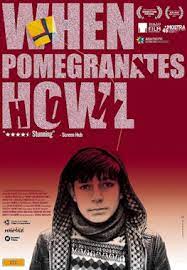
WHEN POMEGRANATES HOWL
Australia, 2020, 80 minutes, Colour.
Arafat Faiz, Elham Ahmad Ayazi, Saeeda Saadat Andrew Quilty.
Directed by Granaz Moussavi.
This is a brief film with an Afghan setting, 2009, the American presence, the NATO presence, the threat of the Taliban and, the presence of journalists.
It was written and directed by Granaz Moussavi, Iranian born, living in Australia. Her previous film was My Teheran For Sale..
The screenplay is based on an actual incident, a NATO helicopter, a bomb, the death of two young boys. Filming took place in Kabul, capturing the atmosphere of Afghanistan during those war years. With locals participating, it has an authentic feel, homes and property, the streets, cart sales, and the contrast with fashionable shops.
At the centre is a young boy, Hewad, played with enormous test by Arafat Faiz. He is nine, his father has been killed in raids – and they use the word “martyred” – living with his mother, not wanting her to marry her brother-in-law who was present, and a very dominating grandmother who dotes on him. He is the breadwinner and so goes out after school to hire a cart and sell pomegranates, beetroot, balloons, as well as amulets specially made and with incense to ward off evil spirits for those who requested it. He is pushed on by other boys with their special space. But he moves around, selling where he can, paying off debts, bring home some money.
But, he has an ambition to be a movie star, having seen many Indian films. And the actor persuades us that he has a great desire to be an actor. He has friends, decides to audition them with role-plays in laughing, weeping, shooting each other falling dead…
An Australian photojournalist encounters him, takes photos, has them published in magazines around the world, introduces the boy to the camera, the boy taking photos of his family for the journalist. There are some tensions with bombings, and a shocking scene where Hewad is serving a group of women and girls who are participating in the dancing lesson, suddenly bombed, the women killed and wounded.
The journalist is wanting to buy some sneakers for his son, asks the boy’s advice and buys him a pair. He and his friends assemble, give up some payment, and are ready for the audition. Helicopter hovers overhead, and the boys are killed.
The journalist tries to pays respect to the family but is shouted at vehemently by the grandmother, the anguish of local people and their grief and anger at the presence of foreigners.
With a focus on the boy and the other children, this film is a reminder of so many fine films from Iran which feature children.
- A story of Kabul, the 2000 is, the American presence, NATO, journalists, the Taliban, bombs and deaths?
- Filmed in Kabul, the homes, the streets, the markets, the fashionable shops, the contrasts? Realistic atmosphere? Musical score?
- The screenplay based on actual events, bombings, family members killed, the helicopters, the death of the two boys?
- The writer-director, Iranian background, Australian background? Her perceptions of the story? Her interpretation of Afghan life in the 2000s?
- Hewad and his story, age 9, his father’s death, at home with his grandmother and mother, little sister, his uncle’s presence, his not wanting him to marry his mother? School, friends? The breadwinner, hiring the cart, arriving late and the disputes about which cart to take, issues of money, shopkeepers, the demands? The cart, the pomegranates, balloons, beetroot, the sales in the street, the hostility of the boys wanting their space, his moving on? Late hours, coming home, love for his grandmother, her wanting him to go to school? The sadness of his mother?
- Hewad and his ambitions to be a movie star, Indian films, the girl helping him drag the cart and promising her a mention? The friends, his talk, the movies, the auditions, the pretend camera, their laughing, their weeping, being shot and dying? His friendship with Navid, his assistant, and with the auditions, collecting the money from the boys?
- The encounter with the photographer, Australian background, his interpreter? Hewad and his story, the promise of being photographed, getting the other boys ready, the journalist and the bombing, buying the shoes for his son, buying trainers for Hewad, his excitement? Hewad with the camera at home on the range of photos of his family?
- Hewad, his personality, a lot of go, ambitions? The incense and the purification rituals, the women asking for them, his selling the amulets, going to the maker, marketing them, the woman at the door with only her arm outside?
- The sequences of the women and girls dancing, bringing in the pomegranate juice, the joy and exhilaration? The bomb and deaths?
- Playing in the square, the rehearsals for the filming, the helicopter, the dropping of the bomb, the two boys killed? The presence of the photographer, the outsiders in Afghanistan, some consequences?